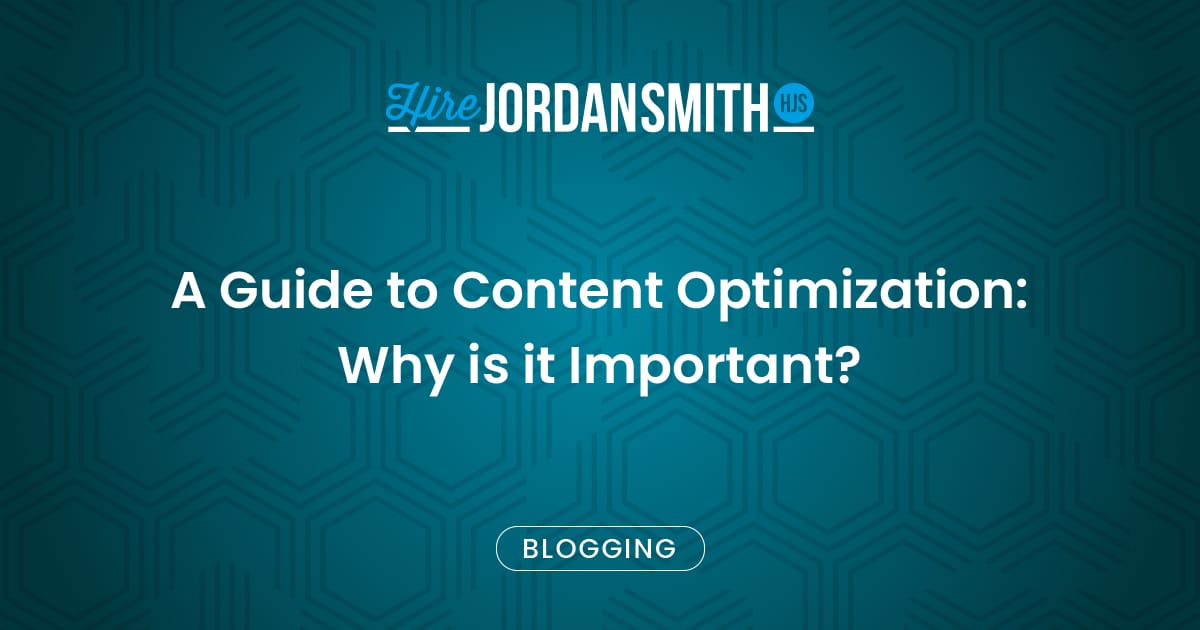Did you know that there are 1.6 billion websites on the Internet today? Among these, 500 million of them are blogs. Additionally, about 2 million blog posts go live every single day.
What do these statistics mean for you as a website/blog owner?
The age of filling pages with text and hoping to be discovered is over. The competition is just on another level, and unless you’re making deliberate steps to get in front of your target audience, you’re as good as dead – business-wise.
You have to make your content discoverable on search engines because that’s where people usually look up information online. Have a content optimization plan in place.
Table of Contents
Content Optimization Definition
To better understand this vital part of today’s digital marketing space, you must first consider the only factors your content is, more often than not, targeted to. That is search engines and, most importantly, your target audience.
Website content optimization makes your content likable to search engines and valuable to your would-be customers. And that is how you stay ahead of all that multitude of endless blogs and articles.
Steps to Optimize Your Content for Search Engines and Users
How do you go about it?
To get ahead of the pack with your content optimization, incorporate the following checklist in your routine to have an optimized content marketing strategy:
- Keyword research
- Quality instead of quantity
- Accuracy
- Watch out for how you use those keywords
And, in more detail…
Keyword Research
This is the first step before you even go out there and start banging out countless words – with topics you’ve certainly created in your head.
Remember, the aim is not to fill up your web pages with information you think your audience might need and hope they find it.
You want to serve your readers just what they are looking for. This is the only way you will leave an impression on their minds and keep them coming back whenever a need arises.
So, keyword research is opening a window into the struggles of target leads.
You can use a tool like Moz for this.
You learn about the problems that keep your readers on their toes through keyword research. That way, you can formulate in-depth solutions as you know the exact pain points to aim at whenever you create a post.
This is huge in several ways.
First, you have a higher chance of being found in SERP results. This alone is definitely not the only reason for search engines to cuddle up with you, but it sure is a step in the right direction.
Secondly, you’re in a better position to understand user intent. This is pivotal in gaining insights into where a lead is in the purchasing journey.
With this information, you can point him/her where you want him/her to be. And that is some serious power there.
Quality Instead of Quantity
Of course, quality is a relative term. And, it’s also possible to have both of these – quality and quantity.
If keyword research is nailed down, you have one piece of the puzzle, right? At least you’re going to create content that serves the needs of your audience, not what you fancy.
But wait!
Your content contains all the useful information a reader is looking for. Great, but can you keep those visitors on that page? Are you presenting that information in a way that is easy for the reader to digest?
It’s not an academic paper. Your readers will hit the back button if they struggle to figure out what it is you are trying to communicate.
You have to optimize your page content to keep them on that page. They won’t even click on your site if you don’t entice them enough.
So, when do we say a piece of content is of the utmost quality? Here are a few things to keep in mind.
- Simple Language – Don’t try to sound smart by jamming up your content with all the jargon you can find worldwide. That will be impressive to people who understand your peers. Not your target audience.
- Not Everyone Has the Time to Read Every Single Word – So you must write for this impatient person. Make your content easy to go through quickly by sprinkling 2-3 sentence paragraphs, bullet points, and strong subheaders throughout the page.
- You Don’t Stand Out by Being Like Everyone – Aim to be the best regarding the value you offer through your content. Look at all the pages that are ranking at the top of the search results. What is it they are doing? What can you do differently?
- The Metadata Is Just As Important – This is what will make anyone click on your website in search results. Both the title and the accompanying meta description should be catchy. You only have a few words; make them count.
Accuracy
Present your ideas in a manner that fronts you as a credible thought leader to your users and search engines.
Two things here: grammar and the sources you link within your posts.
Without good grammar, your content will be a thorn in the flesh to the reader. And, few people will read and trust anything full of grammar and spelling mistakes.
The links signal to search engines that you deserve recognition because you are getting your ideas from people who matter.
Additionally, make sure you know the source of each fact you put. Don’t just go around repeating what others have said without doing a serious background check.
Watch Out How You Use Those Keywords
So, you know the keywords – what your audience is looking for online.
You won’t go full swing and start plastering them all over.
If anything, it will negate all of the above steps. Search engines frown on content with keywords sprinkled all over in an out-of-the-context manner.
Keyword stuffing will also make your content hard to follow, and you know what follows when that happens – you may lose that reader (and more) forever.
In whatever part you decide to use your keyword in, make sure it is as natural as possible. You are not just writing for search engines, remember.
SEO content optimization strikes a balance between the needs of the reader and those of search engines.
Wrapping Up
Just writing content no longer cuts it. You have to take a further step – content optimization – not only to better meet your audience’s needs but also to have a slot in the SERPS. That’s how you’ll be helpful and, hopefully, make bank while at it.
Aside from the above tips on optimizing your page content, check out these website auditing hacks that will boost your rankings.




